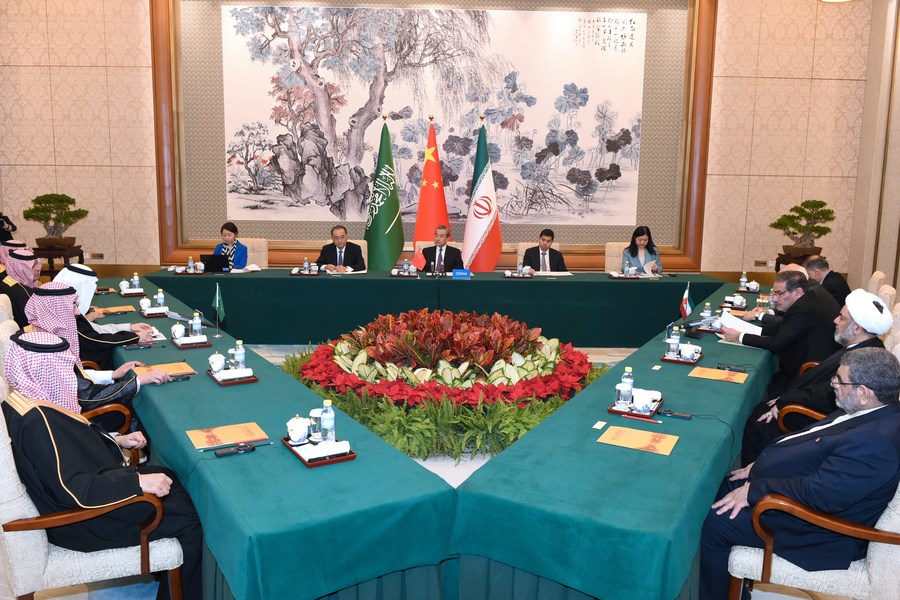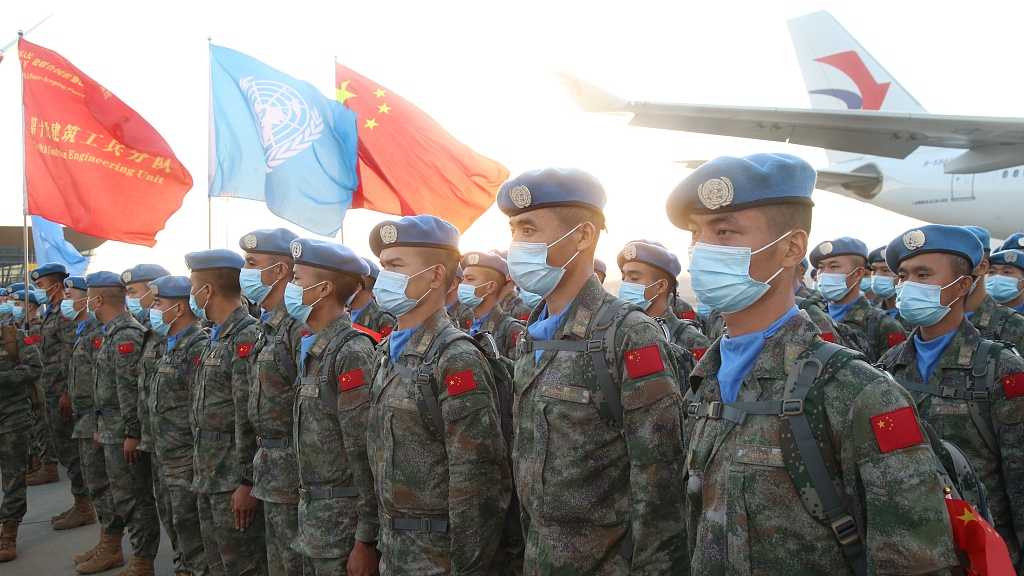After years of open hostility, Saudi Arabia and Iran agreed to restore diplomatic ties following talks facilitated by China on March 10, a significant development for the two nations and a boon to the security and stability of the Middle East.
The Saudi-Iranian agreement to restore diplomatic relations was hailed by Wang Yi, director of the Office of the Foreign Affairs Commission of the Communist Party of China (CPC) Central Committee, as "a victory for dialogue and peace" and has been widely welcomed worldwide.
Wang, who chaired both the opening and closing ceremonies of the Saudi-Iranian talks in Beijing, said the dialogue between the two countries has "become a successful practice for the strong implementation of the Global Security Initiative (GSI)."
The GSI, proposed by Chinese President Xi Jinping at the opening ceremony of the Boao Forum for Asia Annual Conference 2022, seeks to address complex and intertwined security challenges with a win-win mindset.
Chinese wisdom in Middle East rapprochement wave
After the agreement of the two Gulf nations, reconciliatory steps in the Middle East are being taken one after another to break diplomatic impasses.
On April 12, Syrian Foreign Minister Faisal Mekdad arrived in Saudi Arabia – the first visit of a Syrian official since the outbreak of the Syrian civil war in 2011.
Meanwhile, the Gulf nations of Bahrain and Qatar agreed to resume diplomatic ties. Both sides confirmed that the move is a result of shared interests and promoting integration within the Gulf region.
Also this month, Egyptian Foreign Minister Sameh Shoukry visited Ankara, a part of the joint efforts of Türkiye and Egypt to improve their bilateral relations following a decade of political tensions.
The first meeting between the two countries' top diplomats in 11 years took place last month, when Turkish Foreign Minister Mevlut Cavusoglu visited Cairo and held talks with Shoukry.
"The 'spillover effect' of the resumption of diplomatic relations between Saudi Arabia and Iran is manifesting quickly," said Liu Xinlu, a professor of Arab region studies at the Beijing Foreign Studies University.
"More importantly, the GSI conforms to the strong desire of Middle Eastern countries to pursue peace, stability and development and provides them with Chinese wisdom and a Chinese approach to maintain regional peace, eliminate the root causes of conflicts and achieve long-term stability," Liu noted, adding the GSI has been widely recognized and highly appreciated by the countries in the Middle East.

Wang Yi, a member of the Political Bureau of the CPC Central Committee and director of the Office of the Foreign Affairs Commission of the CPC Central Committee, presides over the closing meeting of the talks between a Saudi delegation and an Iranian delegation in Beijing, China, March 10, 2023. /Xinhua
Wang Yi, a member of the Political Bureau of the CPC Central Committee and director of the Office of the Foreign Affairs Commission of the CPC Central Committee, presides over the closing meeting of the talks between a Saudi delegation and an Iranian delegation in Beijing, China, March 10, 2023. /Xinhua
Common security
At a time when many parts of the world are witnessing conflicts, confrontations and disputes, Xi's proposal shows his serious approach to eliminating the root causes of global and regional conflicts, and promoting peace and development around the world.
Ong Tee Keat, chairman of the Centre for New Inclusive Asia, underlined that no country can strengthen its own security at the expense of others, saying that through the GSI, the security concerns of all stakeholders are given due consideration.
In February, China released "The Global Security Initiative Concept Paper" to lay out core concepts and principles around global security and peace.
Meanwhile, to push forward the political settlement of the ongoing Russia-Ukraine conflict, China released a paper stating its position on the issue in February.
In the paper, China put forward a 12-point proposal to end the Ukraine crisis by addressing both the symptoms and the root causes, and reiterated the necessity to end the conflict through dialogue and negotiation.
The peace proposal, since being offered, has been welcomed by many countries. Stephane Dujarric, spokesperson for UN Secretary-General Antonio Guterres, hailed the position paper as "an important contribution."
The position paper is closely related to the GSI concept paper, as both are firmly grounded in international law and the principles of the UN Charter, British political commentator Carlos Martinez told Xinhua News Agency, adding that both papers reflect a profound desire for peace and global prosperity, as well as for a community with a shared future for mankind.
The message is clear: China upholds justice, seeks peace, focuses on the long term and will always stand on the side of peace, oppose hegemonism and power politics, and work with the international community to safeguard the peace and tranquility of mankind.

The 19th Chinese peacekeeping force to Lebanon takes off from Kunming Changshui International Airport in Kunming, southwest China's Yunnan Province, July 28, 2021. /CFP
The 19th Chinese peacekeeping force to Lebanon takes off from Kunming Changshui International Airport in Kunming, southwest China's Yunnan Province, July 28, 2021. /CFP
Extensive recognition
The appeal and influence of the GSI have been growing since it was proposed.
The GSI has gained extensive recognition and a positive response from the global community, with more than 80 countries and international organizations expressing appreciation and support for it.
The initiative has also been written into more than 20 bilateral and multilateral documents on China's exchanges with relevant countries and organizations.
A total of 85.6 percent of respondents to a recent survey of 4,000 people from 20 countries by CGTN "highly agreed" with the principles of the GSI. The figure was 90.4 percent among respondents in developing countries.
Carrying forward the spirit of the UN Charter, the GSI provides a fundamental solution to eliminating the peace deficit, Xinhua quoted Kin Phea, director-general of the International Relations Institute at the Royal Academy of Cambodia, as saying.
China ranks first among the permanent members of the UN Security Council in terms of the number of peacekeepers dispatched and is the second-largest funding contributor to the UN regular budget and peacekeeping assessment.
Chinese peacekeeping police officers have displayed outstanding professional competence and ethics and the UN appreciates China's support for UN police peacekeepers' capacity building and hopes China will play an even greater role in peacekeeping, UN Secretary-General Antonio Guterres said during his meeting with the Chinese delegation attending the second UN Chiefs of Police Summit in 2018.
In addition, escort fleets dispatched by the Navy of the Chinese People's Liberation Army have safely escorted more than 7,100 vessels in the Gulf of Aden and waters off Somalia, of which over 50 percent were non-Chinese vessels, making positive contributions to maintaining the security of important international waterways.
"A strong buttress to the blue flag (of the UN)" was how Csaba Korosi, president of the 77th session of the UN General Assembly, depicted China last September.